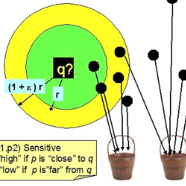Vaccination passports are being issued by governments around the world in order to open up their travel and hospitality sectors. Civil liberty campaigners on the other hand argue that such mandatory instruments encroach upon our fundamental right to anonymity, freedom of movement, and are a backdoor to issuing "identity documents" to citizens by their governments. We present a privacy-preserving framework that uses two-factor authentication to create a unique identifier that can be used to locate a person's vaccination record on a blockchain, but does not store any personal information about them. Our main contribution is the employment of a locality sensitive hashing algorithm over an iris extraction technique, that can be used to authenticate users and anonymously locate vaccination records on the blockchain, without leaking any personally identifiable information to the blockchain. Our proposed system allows for the safe reopening of society, while maintaining the privacy of citizens.
翻译:另一方面,公民自由运动者认为,这种强制手段侵犯了我们匿名和行动自由的基本权利,并且是政府向公民发放“身份文件”的后门。 我们提出了一个隐私保护框架,它使用两个因素的认证来创建一种独特的识别特征,可以用来在路障上找到一个人的疫苗接种记录,但并不储存任何有关他们的个人信息。 我们的主要贡献是使用一种对地点敏感的散射算法来使用一种虹膜提取技术,它可以用来验证用户身份,匿名地在路障上找到疫苗接种记录,而不会泄露任何个人识别信息。 我们提议的系统允许安全地重新开放社会,同时维护公民的隐私。




